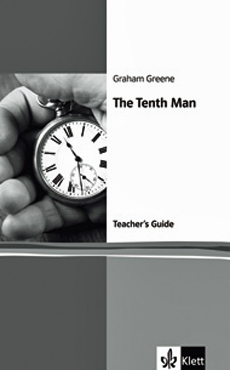Teacher's Guide
2.
Sample
Excerpt from: Third Teaching Unit (Chapter 5)
Reversed Roles
Janvierīs unexpected decision to sacrifice his life for six acres and a house in the provinces, is not at all an act of charity nor a purely spontaneous reaction. Instead his actions were guided by ambition and a desire to raise his self-esteem. Moreover, his decision is made easier by the feeling that because of his illness he wonīt be long for this world anyway.
Now, he sees the chance "to die a rich man" and thus to make his long-felt wish come true. Though his wealth will not be of any use to him, he wants his mother and sister to be proud of him, for they can "show the neighbours at home what sort of a man" he is.
However, thereīs more to it than that. As a rich man Janvier now possesses the authority which Chavel used to have and he quells "all opposition" and behaves like "one who owned half the world". The deal causes "standards" to start "shifting like great weights", as roles are reversed.
Chavelīs former reserve and arrogance turn into humility. He is no longer the superior lawyer asking questions in an authoritative tone, but the petitioner whose questions are put forward "as humbly as if it were he who was the clerk". Janvier now plays the role of a lawyer who interrogates Chavel like a man in the docks, or like a master sounding out his servant and giving short orders. Chavel eagerly accepts this new role, submissively answering Janvierīs questions and obeying orders.
Chavelīs deal, a provocation?
As can be expected, the atmosphere in this chapter is dominated by Janvierīs absurd decision which leads to a conflict between those who made the agreement - Chavel and Janvier- and those who oppose it, i.e. nearly all the other hostages.
At first they seem to regard the young manīs offer as a mockery but when Janvier confirms that he really wants to swop pieces of paper "a long pause as though no one knew what to do next" follows, for the men are unable to believe their ears. Once they are convinced that Janvierīs offer is not a mockery, they split into different factions...

Graham Greene, The Tenth Man, Teacher's Guide
ITEMS
1.
Didactic and Methodical Considerations
2. Sample
Chavelīs state of mind has changed from "hysteria" to "shame" and finally he cannot help feeling remorse, for it dawns on him that the acceptance of his death might have been "more desirable after all than the long obscure route on which his own feet were planted".
The whole chapter progresses to its climax in the following way:
-
from hysteria to remorse
- from
quarrelling to "grim peace" (20 7f)
- from
light to "darkness" (21 5) and
- from
life to death for the doomed men as in their minds the future stands
"as inalterably as birth" (21 12).
This progression is symbolically expressed by the monotonous ticking of the watch telling them that time is running out.
Teaching steps -> see the book
Contact: info@new-english-readers.de
